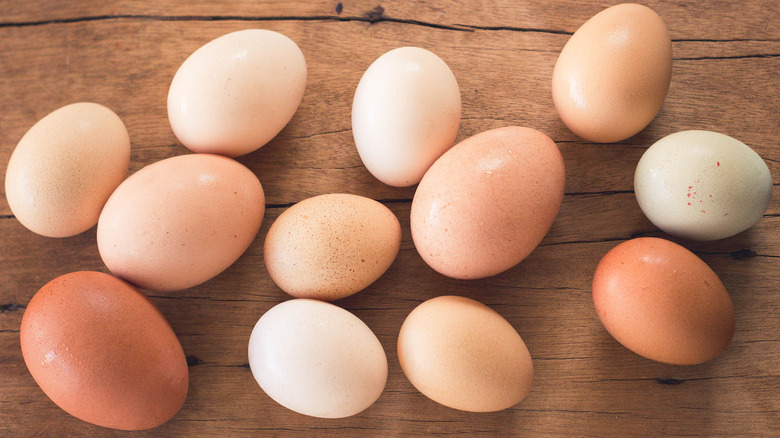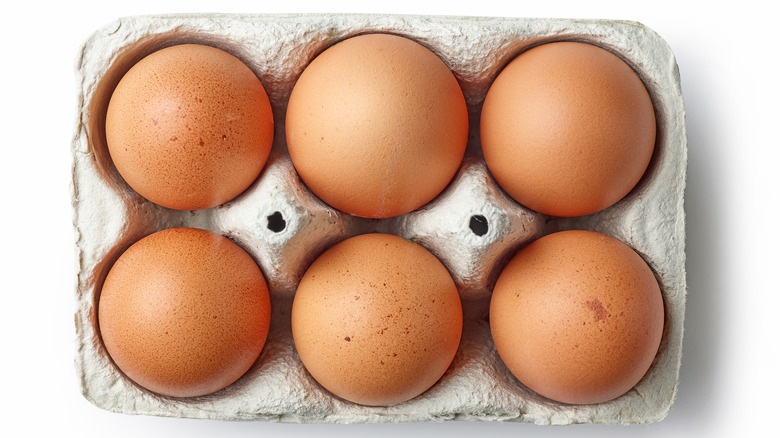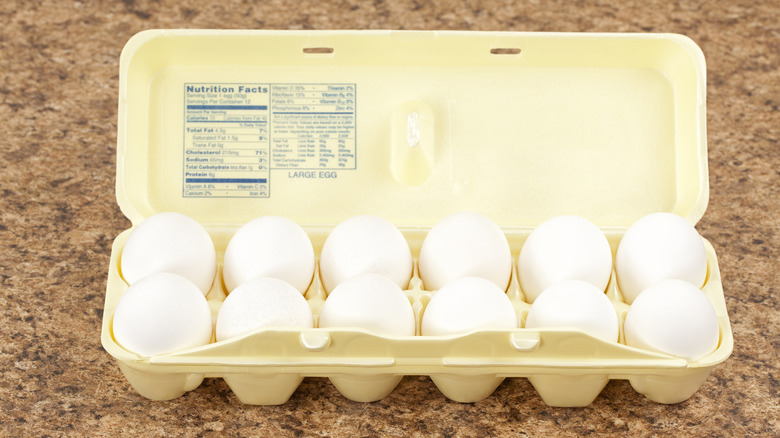What Recipes Mean When They Ask For A Large Egg
Eggs appear in a ton of recipes, and besides being tasty, there's a good reason why: eggs contain many of the major nutrients we need (proteins, amino acids, etc.), without containing too many calories. But always check the recipe carefully, because sometimes the instructions will specify, whisk "large eggs" instead of just "eggs." You might be wondering what that means — surely they don't mean an ostrich egg, which weighs a hefty three pounds and is about the size of a human hand.
There's actually a range of sizes for the chicken eggs you buy at the grocery store, though none of them quite measure up to an ostrich egg. You've got the (adorably named) peewee, small, medium, large, extra large, and jumbo eggs, and these are all official names/size ranges outlined by the USDA. A large egg is usually considered to be 2 ounces or about 57 grams. Once it hits 2.25 ounces (64 grams) it becomes an extra-large egg, and jumbo eggs are anything over 2.5 ounces (71 grams).
Put your eggs in a row
Large eggs are often the default size in the store, and if a recipe doesn't specify, it's safe to assume you should be whisking large ones. Still, it's important to double-check because some recipes will call for extra-large eggs or other sizes, and ignoring that could mess up your ratios. Add too much egg and your dish becomes cakey or even rubbery; add too little and your dish will turn out dry.
Do you absolutely need to use large eggs when a recipe calls for them? No, but if you've only got smaller eggs, then you'll need to use more of them. In this case, it helps to weigh your eggs (out of the shell) with a kitchen scale if you've got one because if a recipe calls for four large eggs, it means you need to add eight ounces of egg to make up the difference. If you've got a batch of medium eggs that are only 1.75 ounces each, then you'll need to crack an extra. If you end up with some leftover whites or yolk, you can save the remainder for another dish.
Finding the biggest eggs
When it comes to substituting eggs, it's more of an issue in larger dishes that require lots of them. For everyday scrambled eggs, poached eggs, or other small dishes you're just making for breakfast, you may only use one or two. In these cases, the size doesn't matter too much, and substituting a medium or extra-large for a large egg won't make that much of a difference. Once you start working with about four eggs or more, it begins to matter.
Keep in mind that "egg size" in this context refers to weight and not how big the egg looks. So it's not always easy to eyeball an egg and guess before cracking it open (although it can give you a good starting point). Luckily, egg carton labels will usually tell you the weight of the carton. If the label tells you the weight is about 24 ounces for a dozen eggs, that means you've got a bunch of two-ounce large eggs. Because large eggs are the standard anyway, you shouldn't have to look hard to find them.


